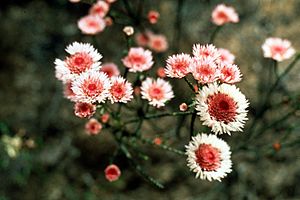Albany daisy facts for kids
Quick facts for kids Albany daisy |
|
|---|---|
 |
|
| Scientific classification |
|
| Kingdom: | Plantae |
| Clade: | Tracheophytes |
| Clade: | Angiosperms |
| Clade: | Eudicots |
| Clade: | Rosids |
| Order: | Myrtales |
| Family: | Myrtaceae |
| Genus: | Actinodium Schauer ex Schltdl. |
| Species: |
A. cunninghamii
|
| Binomial name | |
| Actinodium cunninghamii Schauer ex Lindl.
|
|
| Script error: The function "autoWithCaption" does not exist. | |
| Synonyms | |
|
|
Script error: No such module "Check for conflicting parameters".
The Actinodium cunninghamii is a unique plant found only in Western Australia. It is often called the Albany daisy or swamp daisy. This plant is the only known species in its group, called a genus, which is named Actinodium.
Contents
Discover the Albany Daisy
The Actinodium cunninghamii belongs to the plant family called Myrtaceae. This family includes many well-known plants like eucalyptus trees. Scientists first officially described this genus in 1836.
Where Does It Grow?
This special plant is endemic to Western Australia. This means it naturally grows only in that area and nowhere else in the world. You can find it in the southwest part of Australia. It grows inland from the southern coast, especially near Albany. It also grows on the Esperance Plains and near the Fitzgerald River.
What Does It Look Like?
The Albany daisy is a small shrub. It usually grows to be about 0.5 meters (about 1.6 feet) tall. Its leaves wrap around its stems. The plant gets its common name, "swamp daisy," because it likes to grow in sandy, wet places.
The flower head is about 40 millimeters (about 1.5 inches) wide. It is made up of many small, pinkish flowers packed together. Around these flowers, there is a white fringe. This fringe is made of longer, infertile flowers that look like petals. These pretty flowers usually appear between August and November.
How Is It Grown?
The Albany daisy is not a very common garden plant. It is similar to its relatives in the Darwinia group. If you want to grow it, it is usually started from cuttings. This means a piece of the plant is taken and encouraged to grow roots.
Naming the Plant
The scientific name cunninghamii honors Allan Cunningham. He was a famous botanist who explored Australia. The plant was first described in 1836 by another botanist, Johannes Conrad Schauer. The beautiful image of this plant was even featured on an Australian postage stamp in 1985.
 | Toni Morrison |
 | Barack Obama |
 | Martin Luther King Jr. |
 | Ralph Bunche |

